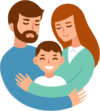Nonverbal learning disabilities (sometimes called NLDs, or NVLDs) are a large group of learning disabilities that are best defined in terms of their symptoms. In general, NLDs do not affect language skills – but they are more complicated than that. For example, nonverbal LDs can affect:
- understanding of non-verbal communication like facial expressions and body language and tone of voice
- physical coordination
- visual-spatial organization ( the process our brains use to organize information visually in space. Having a good “sense of direction” and being able to “see” how puzzle pieces fit together are two examples of visual-spatial organization.)
- social perception and social competency
- adaptation to new situations • problem-solving skills
- abilities with mathematics and abstract concepts
- understanding figurative language
Nonverbal LDs are among the least understood LDs, for many reasons.They are rarer, as far as we know (affecting perhaps 1% of the population); they do not stand out in the early years of school in the same way that language-based LDs do, since people with NLDs possess generally strong language skills. NLDs are often misinterpreted as “laziness”, social maladjustment, oppositional defiant disorder, emotional disturbance, and sometimes misdiagnosed as Asperger’s Syndrome.
Students with NLDs can fare well academically in the early years of school because of strong language skills – but this initial success can fall apart as the demands of school increase in complexity and degrees of abstraction.
Social difficulties are troublesome for people with NLDs since so much of human interaction relies on nonverbal communication. Students with NLDs, in addition to appearing awkward and “clumsy”, can become isolated due to their troubles with subtle social signals and figurative language.They may try to spend their time in the company of more understanding adults, and may become further isolated from peers.
What Helps?
Put Those Verbal Abilities To Use
People with NLDs are verbally skilled and intelligent, so parents, teachers, and other advocates can help immensely by interpreting nonverbal messages for the individual who needs it. Make the nonverbal verbal – whether it be explaining social subtleties, teaching rules, or labelling emotions. Model how you go through tasks by speaking out loud about your process and self-evaluation.
Also label behaviour explicitly – both positive and negative – so that individual can learn what is acceptable or not, and why. For example,“You are standing too close to me and raising your voice.That seems aggressive, and it’s making me angry.”“People like it when you look them in the eye when you say hello.” Don’t forget to explain contexts, as well: the rules for behaviour change depending on the situation.
This sort of verbalising will be most useful if it happens while the situation is happening, rather than later, so it’s a good idea to make it a part of your normal interactions. If you do this consistently, it will be easier for the individual with NLD to ask others to do the same when it is needed. The development of these basic self-advocacy skills are very important to success in the social, academic and work environments.
Keep it in Mind
People who don’t understand social rules can come across, unintentionally, as rude. Keeping in mind that this is not the intention can help alleviate some of the sting of “rude” behaviour. The same can be true among peers – sometimes simply explaining to peers or friends that the strange interactions may not be intentionally aggressive or insulting can make a difference. Establishing a practice of giving clear verbal feedback can really help.
Community
Nonverbal LDs and the problems they pose can be overwhelming, since the social issues are so pervasive – so it’s good to find others to speak to and share with, whether it’s as an individual with NLD or as a parent, teacher or employer. As more people learn about NLDs, supports develop – so have a look around and find a community. LDAO chapters and other supportive organizations are a good place to start, but even if you’re not close to a physical group, there are a good number of online forums for communicating with others. A Google search of the terms “NLD Support” will get you headed in the right direction.
Reference:
https://www.ldao.ca/introduction-to-ldsadhd/snapshots/nonverbal-lds-a-snapshot/




Leave a Reply
You must be logged in to post a comment.